- Title: Star Wars: Episode I – The Phantom Menace
- IMDb: link

Hoping to resolve the matter with a blockade of deadly battleships, the greedy Trade Federation has stopped all shipping to the small planet of Naboo.
While the Congress of the Republic endlessly debates this alarming chain of events, the Supreme Chancellor has secretly dispatched two Jedi Knights, the guardians of peace and justice in the galaxy, to settle the conflict…
 Now that the “Skywalker Saga” is complete, it seems like a reasonable time to go back and look through the various Star Wars films. Unlike some, I come not to condemn The Phantom Menace. Despite its flaws, the film has genuinely great moments, strong new characters, and vivid new worlds all while doing more world building than any Star Wars property other than the original Star Wars. Does it measure up to Lucas’ original? No, certainly not. But it’s far from the weakest Star Wars film.
Now that the “Skywalker Saga” is complete, it seems like a reasonable time to go back and look through the various Star Wars films. Unlike some, I come not to condemn The Phantom Menace. Despite its flaws, the film has genuinely great moments, strong new characters, and vivid new worlds all while doing more world building than any Star Wars property other than the original Star Wars. Does it measure up to Lucas’ original? No, certainly not. But it’s far from the weakest Star Wars film.
Set at the end of the Old Republic, Star Wars: Episode I – The Phantom Menace introduces us to the young boy who would grow into the most terrifying creature in the galaxy. Jake Lloyd is cast as the boyish slave Anakin Skywalker. Lloyd is your average kid actor and the failures of Anakin here have more to do with the choice to make him far younger than necessary than Lloyd’s performance. We’re also introduced to Queen Padme Amidala (Queen Amidala ) of Naboo, a young ruler struggling with the occupation of her planet by the Trade Federation, and Jedi Knight Qui-Gon Jinn (Liam Neeson) who arrives on Naboo with his apprentice Obi-Wan Kenobi (Ewan McGregor).
Of all the new characters presented in the prequel trilogy it is important to note that the best, our heroic Jedi Qui-Gon Jinn and villain Darth Maul (Ray Park), only appear in this film. Despite the awkwardness of starting out a space opera with trade negotiations and politics, Lucas lays the groundwork here as every action involving the Trade Federation and Naboo, along with the unrest in the Galactic Senate, feeds the interest of a single character. While Lucas meant the prequels to focus on Anakin Skywalker, viewed from the perspective of Palpatine (Ian McDiarmid), who continues to manipulate and gain power over the course of the three films, darker hues can be found. It’s also the only one of the films that includes Keira Knightley (as the Queen’s doppelganger and guard), so it’s got that going for it as well.
The film certainly has its faults, many traceable back to George Lucas’ attempting to connect too many dots at once (did Anakin really need to build C-3PO, did he really need to live on Tatooine, etc.). The politically-incorrect members of the Trade Federation and Jar Jar Binks (Ahmed Best) also certainly aren’t assets to the story. And while I love Naboo, how exactly Amidala is an elected Queen, and why they would elect child rulers, is certainly perplexing (something that could have been solved by keeping the age gap of Anakin and Padme in place but aging both characters significantly at the start). Had Lucas chosen to introduce Anakin ten years older in this film (basically the age we see him in the next film) many lingering issues would have been solved and would also have allowed a more hardened version of the character to help explain the Council’s reluctance at training him (for actually being too old) and better built up his infatuation with an older (actually older) woman. And I won’t get into a discussion of Midi-chlorians (but I do understand the idea of the Jedi understanding the Force more scientifically at this time than Luke would).
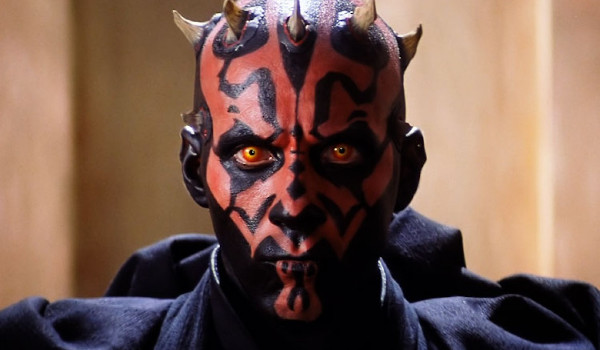
McGregor is well-cast as the younger Obi-Wan, and would grow more comfortable in the role in the next two films. Included for a younger audience, Jar Jar has his fans (and a reasonable number of detractors) as do the goofy Roger Robots of the Droid Army who would become staples of more than one Star Wars animated series. The tragedy of Qui-Gon is central to both the plot of this film and pairing Anakin and Obi-Wan together in the next, but his presence would certainly have helped Attack of the Clones (as would more Darth Maul). Although Yoda (Frank Oz) doesn’t look quite right as CGI, the complexities of the Jedi and seeing them at their height is certainly of interest.
Anakin’s introduction to the Jedi Council, and their distrust of him, is but one of several seeds Lucas plants over the course of the film foreshadowing things to come (such as Palpatine’s remark to young Skywalker at the end of the film). The Phantom Menace also offers two amazing set pieces in the pod race and “Duel of the Fates” which has still yet to be surpassed as the best lightsaber fight of any Star Wars film. Both hold up remarkably well, as does the sleek Nubian starship (my favorite of the prequel films). The “first” Star Wars movie is certainly flawed, but it’s certainly not lacking ambition (something the paint-by-number Solo: A Star Wars Story is almost completely devoid of).

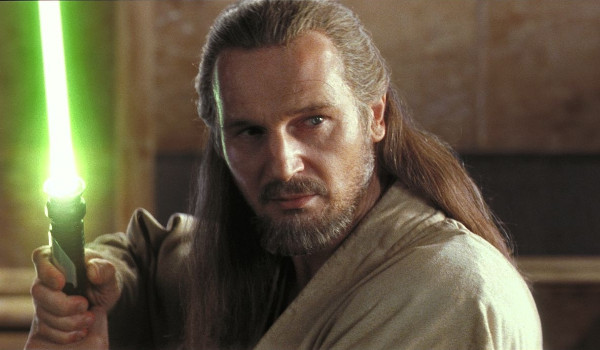
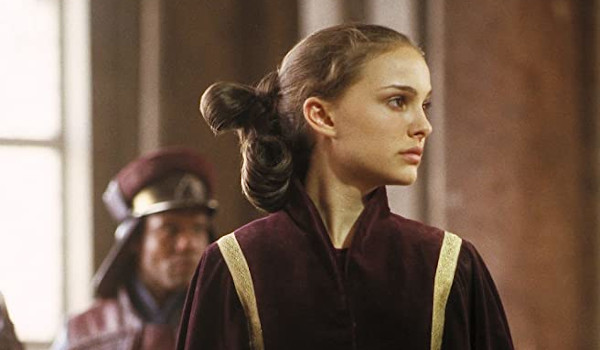
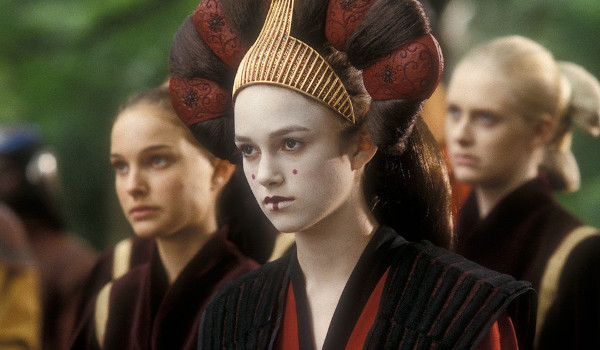
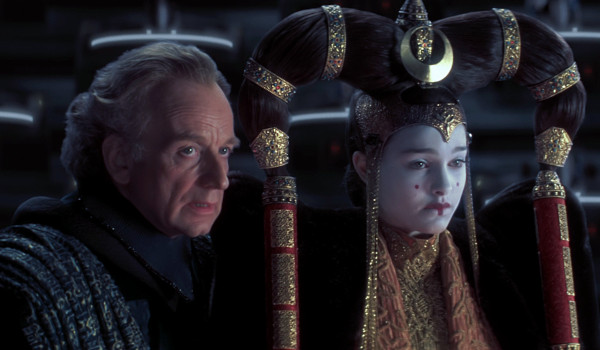
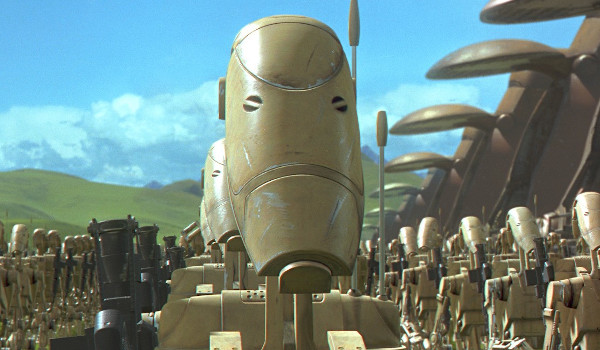
Maul is awesome!